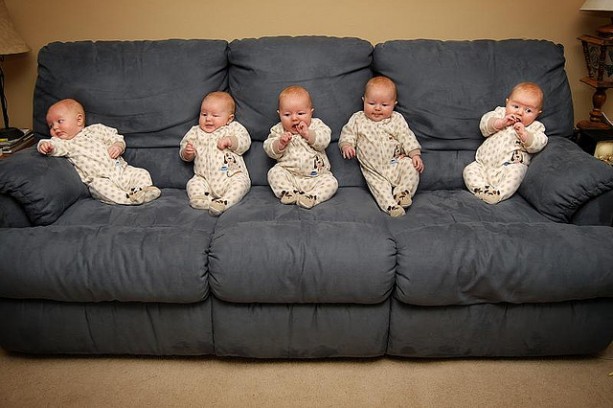
In Squaring Off, Zócalo invites authors into the public square to answer five probing questions about the essence of their books. For this round, we pose questions to Bryan Caplan, author of Selfish Reasons to Have More Kids: Why Being a Great Parent is Less Work and More Fun Than You Think.
Many of us put a lot of effort into our kids-too much, argues economist Bryan Caplan of George Mason University. Relax, turn on the TV, and accept that your kids probably aren’t much affected by most of what you do. They’ll be fine either way. So have more of them.
1) You contend that parents might want more kids if they’d stop “overcharging” themselves, as you call it, and start turning their child over to the television or to a nanny. But that still leaves the cost of daycare, food, tuition, and many other things. As a percentage of kid-cost, then, does “overcharging” really represent anything particularly large?

For most parents today, “overcharging” is indeed large. Many parents lose years of sleep, even though they could use the highly effective Ferber method to get their young kids to sleep through the night. Many parents spend hours every week on kid activities that neither they nor their kids enjoy. Many parents put up with bad behavior, even though clear, consistent, mild punishments (like “the naughty corner”) work well. And many parents push themselves so hard that they explode at their kids on a regular basis. Bottom line: If you’re limiting your fertility because of the emotional cost, you should know that a lot of the emotional cost of parenting is self-imposed.
I’d add that parents inflate the financial cost of kids, too. Being adopted by a high-income family has little effect on adoptees’ educational or career outcomes, strongly suggesting that most of the advantages such families offer their kids barely work.
2) Okay, so let’s cut out tuition. Even daycare is going to be $1000 a month if you’re lucky. Median household income in the U.S. is $52,000 a year. Why should average Americans feel encouraged by your argument?
In my book I try to focus on evidence that isn’t already widely known. I don’t have anything original to say about the financial cost of childcare. If the financial cost of childcare is the sole determinant of the number of children you want, my evidence isn’t very relevant for you. However, there are plenty of other people with different attitudes and different circumstances for whom my evidence is very relevant indeed. Closely related: See my graphical reply to my WSJ critics.
3) So how bad a parent do I have to be before I really start negatively affecting life outcomes for my children? Will they bounce back from pretty much anything?

It’s easy to identify family environments so awful that they do serious lasting harm: severe neglect, physical abuse, and Third World-style poverty. And an important limit on adoption and twin studies is that they usually have moderately restricted samples; the worst First World families are underrepresented.
However, within the First World, broader samples don’t generally find larger parental effects than narrower samples. Many Scandinavian studies are based on national samples, and yet their estimates for the effect of family environment are about the same as those from narrower U.S. samples. So it’s fair to say that families that are bad by Scandinavian standards are still good enough. Bruce Sacerdote’s Korean adoption study, which found only small effects of upbringing on education and virtually no effect on adult income, included U.S. families with incomes just 25% above the poverty line. He also failed to find larger effects than other studies.
Bottom line: We know that severe abuse and neglect and Third World- level poverty are very bad for kids. We know that very low-quality Scandinavian families and quite low-income U.S. families are OK. On the range between these two categories, the data just isn’t in.
4) Okay, so let’s just say I’m garden-variety bad as a parent. I don’t teach my kids to say thank you, I spoil them materially, I leave them to the nanny mostly, and I stick them in front of the TV all weekend. Nothing to worry about?
They’re more likely to aggravate you when they’re kids, and less likely to have a close relationship with you when they’re adults. But life in the broader world will soon teach them the interpersonal skills you undermined. And their long-run health, intelligence, happiness, success, character, and values will be roughly the same. Your bad example may even inspire them to excel in all the ways you failed. It happens all the time.
5) All right, well, there are lots of things we believe to be true in theory yet don’t really act on practice. You’re a parent. Be honest: how much do you follow your own advice on being laid-back in child rearing?
When decisions are up to me, I honestly do practice what I preach. And while my wife isn’t as convinced as I am – I’d describe her as halfway between me and normal – we don’t have major parenting disagreements. By and large, we focus on making family life fun and memorable, and let our kids’ future take care of itself.
Buy the book: Skylight Books, Powell’s, Amazon
*Photo courtesy of J. Star.



